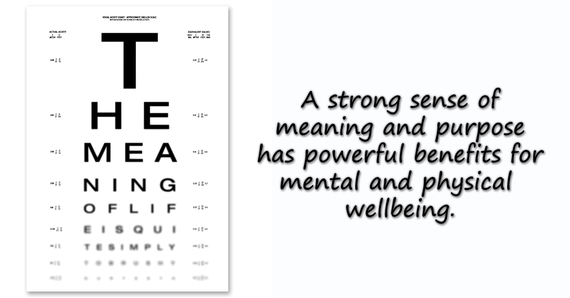This article first appeared on the blog of Intentional Insights, a nonprofit organization that empowers people to refine and reach their goals by providing research-based content to help improve thinking, feeling, and behavior patterns.
"What is the meaning of life?"
I struggled with this question throughout my teenage years and young adulthood. My parents tried to convey their meaning of life to me when I was a teenager. Yet my contrarian streak prevented me from really listening to them. Instead, I thought and talked about the meaning of life with my friends. I remember long conversations when we would discuss and debate this topic with each other. I particularly remember one conversation when I was 18 -- my two closest friends and I stayed up until 5 a.m. playing cards, drinking, and trying to convince each other that our individual vision of the meaning of life made the most sense.
Going to college prompted further thought. Listening to professors and reading great books caused me to rethink the meaning of life many times. I really gained a richer perspective, but never a clear answer to my question -- "What is the meaning of life?" That was until discovering research about this question.
But, before going into that, let me answer a question that some of you may have on your mind: Why does my story matter? Who cares whether some guy figured out the meaning of life or not? Aren't there bigger fish to fry in the world -- hunger, disease, polarized political debate? Why even spend time worrying about the meaning of life?
Recent research shows that people who feel that their life has meaning experience substantially higher sense of mental health and wellbeing. For example, Michael F. Steger, a psychologist and director of the Laboratory for the Study of Meaning and Quality of Life at Colorado State University, found that many people gain a great deal of psychological benefit from understanding what their lives are about and how they fit within the world around them. His research demonstrates that people who have a sense of life meaning and purpose feel in general more happy as well as more satisfied on a daily level, and also feel less depressed, anxious, and are less likely to engage in risky behaviors.
A sense of meaning also helps improve physical health. An increased sense of life meaning and purpose correlates with reduced risk of heart attack, the leading cause of death in the United States, and stroke, another of the top five leading causes of death. With such benefits for mental and physical well-being, it is no wonder that a strong sense of life meaning and purpose predicts longevity.
Additionally, research shows that it does not matter how you get this sense of meaning and purpose in life. What's most important is that you experience your life as having a meaning and purpose. The key question is not, "What is the meaning of life?" In fact, research seems to show that there is no one clear answer to this question. The only question that matters is "What is the meaning of life for you?" Each of us is free to formulate her or his own answer to this question. By doing so you get a personal sense of life meaning and purpose, and thus gain a sense of agency and choice by and through understanding your own personal life goals.
So let me ask you a question: "What is the meaning of life for you?"
How do you even evaluate this question? Fortunately, there's a science-based questionnaire you can use to get at your current sense of meaning and purpose. There's also a web app that enables you to evaluate and track the development of your sense of meaning and purpose over time.
I will leave you with some questions to consider:
1) Do you think you are losing out on mental and physical health and well-being due to an insufficiently developed sense of meaning and purpose?
2) If so, what specific steps can you take to improve your sense of meaning and purpose?
Bio: Dr. Gleb Tsipursky is a social entrepreneur, writer, science popularizer, and scholar. He leads Intentional Insights, authored Find Your Purpose Using Science, and is a tenure-track professor at Ohio State. Subscribe to his newsletter, support his writing on his Patreon page, and get in touch with him at gleb@intentionalinsights.org.


